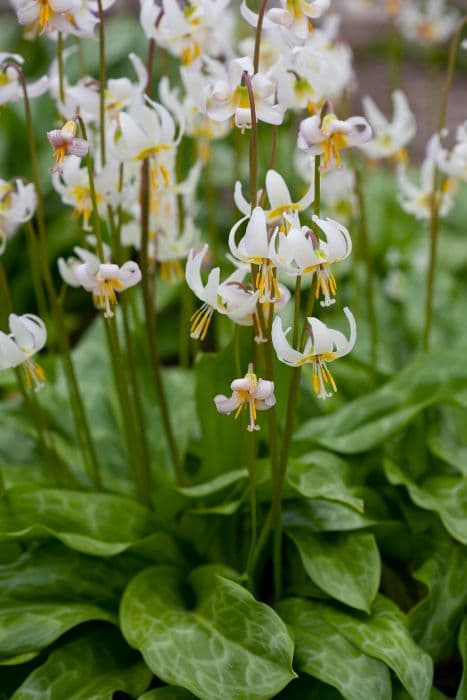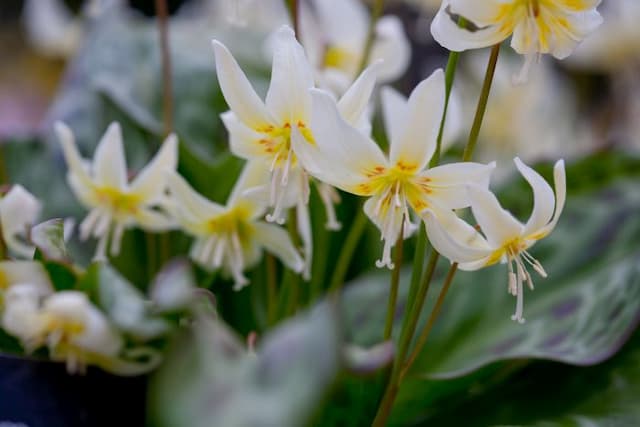Trumpet Lily Lilium 'Delicate Joy' (Ia/b)

ABOUT
Lilium 'Delicate Joy' is a captivating plant known for its ornamental features, which is commonly referred to as a lily. It is characterized by its trumpet-shaped flowers, which boast a striking blend of colors. The petals often present a delicate graduation of hues, typically ranging from a creamy white at the edges to a gentle pink or soft apricot toward the throat. The flowers are spotted, with a smattering of freckles in a darker shade, adding to the charm and uniqueness of each bloom. Radiating from the center of the flower are anthers, which carry a contrasting color, commonly a bold rust or deep brown, standing prominent against the softer tones of the petals. These anthers surround the central pistil, which leads back into the flower's core. Below the flowers, the foliage of the lily consists of long, slender, dark green leaves that are arranged in a spiral pattern around the sturdy stem. These leaves can appear somewhat glossy and provide a lush backdrop for the showy flowers above. Overall, the 'Delicate Joy' lily exudes an air of elegance and grace. The intricate interplay of colors and delicate spots makes it a popular choice for gardens and floral arrangements alike, bringing a touch of refined beauty wherever it is planted or displayed.
About this plant
 Names
NamesFamily
Liliaceae
Synonyms
Delicate Joy Lily, Asiatic Lily Delicate Joy
Common names
Lilium 'Delicate Joy' (Ia/b).
 Toxicity
ToxicityTo humans
The plant commonly known as lily, including the variety 'Delicate Joy,' is not highly toxic to humans. However, ingestion of lilies can cause minor symptoms such as nausea, vomiting, and diarrhea. Although rarely life-threatening, anyone who experiences symptoms after consuming any part of a lily should seek medical advice.
To pets
Lilies, including the 'Delicate Joy' variety, are highly toxic to cats. Even small amounts of any part of the plant, especially the leaves, petals or pollen can lead to severe kidney damage. Symptoms of lily poisoning in cats can include vomiting, lethargy, lack of appetite, and changes in urination. Without prompt veterinary treatment, ingestion can result in kidney failure, which can be fatal. Dogs are less sensitive, but may still experience mild gastrointestinal upset after ingesting lilies. Owners should keep lilies out of reach of their pets, especially cats, and seek veterinary care immediately if ingestion is suspected.
 Characteristics
CharacteristicsLife cycle
Perennials
Foliage type
Deciduous
Color of leaves
Green
Flower color
Varies
Height
2-6 feet (0.6-1.8 meters)
Spread
1-2 feet (0.3-0.6 meters)
Plant type
Bulb
Hardiness zones
4-9
Native area
Asia
Benefits
 General Benefits
General Benefits- Visual Appeal: Adds aesthetic value with its delicate and vibrant flowers, enhancing the beauty of gardens and landscapes.
- Habitat Support: Provides nectar for pollinators like bees and butterflies, supporting local ecosystems.
- Low Maintenance: Typically requires minimal care once established, making it suitable for a variety of gardeners.
- Perennial Growth: As a perennial, it returns year after year, offering long-term planting benefits.
- Color Variety: Offers a range of colors that can complement various garden themes and palettes.
- Cut Flowers: The blooms are ideal for cutting and using in floral arrangements, which can brighten indoor environments.
- Seasonal Interest: Flowers in the spring or summer, providing seasonal interest in the garden when other plants may not be in bloom.
- Space Efficiency: Its upright growth habit makes it suitable for gardens with limited space.
 Medical Properties
Medical PropertiesThis plant is not used for medical purposes.
 Air-purifying Qualities
Air-purifying QualitiesThis plant is not specifically known for air purifying qualities.
 Other Uses
Other Uses- Creative Art Projects: The petals of the Lily can be pressed and used in art pieces or to decorate handmade paper, adding a natural floral element to the design.
- Perfumery: Lily 'Delicate Joy' may be used as a natural source of fragrance for perfumes, given their distinct and pleasant scent.
- Edible Garnishes: The petals of some lilies are edible and can be used to embellish desserts and cocktails, though one must ensure they are non-toxic and pesticide-free before consumption.
- Wedding Decorations: Lilies are often used in wedding flower arrangements, bouquets, and as decorations for their elegant and joyful appearance.
- Floral Dyes: The vibrant colors of Lily 'Delicate Joy' can be used to naturally dye fabrics, yarns, or papers.
- Photography Subjects: The striking appearance of lilies makes them excellent subjects for floral and botanical photography, often used in portfolios and stock images.
- Eco-friendly Confetti: Dried Lily petals can be used as biodegradable confetti for celebrations, providing an environment-friendly alternative to plastic confetti.
- Symbolic Gifts: Lilies often symbolize purity and renewal, making them suitable as gifts for events that mark new beginnings like graduations or new jobs.
- Teaching Tools: In educational settings, Lily 'Delicate Joy' can be used to teach botany and plant biology, as well as art classes for botanical illustration.
- Textile Pattern Inspiration: The color and shape of Lily 'Delicate Joy' flowers can serve as inspiration for textile patterns in fashion and home decor.
Interesting Facts
 Feng Shui
Feng ShuiThe Lily is associated with purity and the nurturing aspect of Feng Shui; it can be used to bring a calming and harmonious energy to a space. It is often placed in living rooms or bedrooms to promote a peaceful atmosphere, or in areas where a touch of elegance is desired. According to Feng Shui principles, white lilies such as the 'Delicate Joy' could be particularly potent when placed in the Metal elements of a home, such as the west or northwest areas, to promote clarity and precision.
 Zodiac Sign Compitability
Zodiac Sign CompitabilityThe Lily is not used in astrology practice.
 Plant Symbolism
Plant Symbolism- Purity - Lilies are often associated with purity and innocence, reflecting their pristine appearance and commonly white color.
- Beauty - With their elegant form and striking colors, lilies symbolize beauty and grace.
- Humility - In Christian symbolism, the lily is a symbol of humility and devotion.
- Renewal - The lily can represent rebirth and new beginnings, as it is often connected to the resurrection in Christian belief.
- Hope - The lily embodies hope, representing the expectation of a positive outcome and happiness.
- Motherhood - In ancient cultures, lilies were linked to motherhood and fertility due to their prolific seed production.
 Water
WaterAsiatic lily 'Delicate Joy' should be watered thoroughly, ensuring moisture reaches the roots, but allow the soil to dry slightly between waterings. On average, water once a week with about 1 gallon per plant, adjusting for rainfall and temperature, providing more frequent watering in hot, dry conditions. Over-watering or allowing the bulbs to sit in waterlogged soil can lead to rot, so ensure good drainage. During the active growing season in spring and summer, consistent watering is key, but reduce frequency as the plant goes dormant in the fall.
 Light
LightAsiatic lily 'Delicate Joy' thrives in full sun to partial shade, so choose a spot that receives at least 6 hours of direct sunlight daily. These lilies can tolerate some afternoon shade, especially in hotter climates, which helps protect their blooms from intense, midday sun. Avoid excessively shaded areas, as too little light can lead to weak stems and fewer flowers.
 Temperature
TemperatureAsiatic lily 'Delicate Joy' prefers temperate conditions and can generally tolerate temperatures ranging from 45 to 85 degrees Fahrenheit. These lilies require a cold dormant period, so winter temperatures should ideally drop below 60 degrees Fahrenheit but remain above freezing. Protecting the bulbs with a layer of mulch can help moderate soil temperature extremes.
 Pruning
PruningAsiatic lily 'Delicate Joy' benefits from pruning to remove dead or spent flowers, which encourages more blooms and prevents the plant from spending energy on seed production. After blooming, cut the flower stalks back to just below the lowest flowers to preserve the foliage's photosynthesizing ability, which supports bulb development for the next season. Once the foliage has yellowed and died back in the fall, it can be removed.
 Cleaning
CleaningAs needed
 Soil
SoilThe best soil mix for Asiatic Lily 'Delicate Joy' should be well-draining, rich in organic matter, and slightly acidic to neutral with a pH of 6.0 to 7.0. A mix of loamy garden soil, peat moss, and perlite or sand is ideal to ensure proper drainage and fertility.
 Repotting
RepottingAsiatic Lily 'Delicate Joy' typically does not require frequent repotting and can be done every 2-3 years or when the bulbs become crowded. The best time to repot is in the autumn after the foliage has died back.
 Humidity & Misting
Humidity & MistingAsiatic Lily 'Delicate Joy' thrives in average humidity conditions typically found in outdoor environments. While specific humidity ranges are tolerable, it is important to avoid overly humid conditions which can promote fungal diseases.
 Suitable locations
Suitable locationsIndoor
Place Asiatic Lily in a bright spot, ensure proper drainage.
Outdoor
Plant in well-draining soil; ensure full to partial sun.
Hardiness zone
3-9 USDA
 Life cycle
Life cycleLilium 'Delicate Joy', commonly known as the Lily, begins its life cycle as a bulb, dormant through the winter and typically planted in the autumn before the frost. With the onset of spring, shoots emerge from the soil, turning into sturdy stems with narrow leaves, a stage characterized by vegetative growth. As the plant matures into early summer, buds form at the top of the stems and soon blossom into large, trumpet-shaped flowers, showcasing a variety of colors that may include shades of whites, pinks, reds, and oranges, specific to the 'Delicate Joy' cultivar. Once the flowering stage is complete, pollination may occur via insects, leading to seed formation if the flowers are fertilized. The seeds then develop and, upon ripening, they are dispersed by wind or animal activity, ending the reproductive phase. As temperatures drop in late autumn, the above-ground parts of the Lily wither away, allowing the bulb to enter dormancy once again, thus completing its annual cycle.
 Propogation
PropogationPropogation time
Early Spring
Lilium 'Delicate Joy', commonly known as a lily, is typically propagated through bulb division, a method frequently employed during late fall after the foliage has died back or in early spring before the growth commences. To propagate by bulb division, carefully dig around the plant to lift the bulb from the soil, avoiding damage to the bulbs and roots. Gently separate the smaller bulblets from the main bulb, which are naturally formed as part of the plant's growth cycle. These bulblets can be replanted immediately in well-draining soil at a depth approximately three times the height of the bulb, about 4 to 6 inches (10 to 15 centimeters) apart to allow for enough space for the new plants to grow. Water the newly planted bulblets thoroughly to establish them in their new location.








